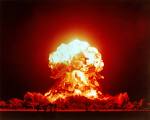 Karl Rove predicated George W. Bush’s 2004 reelection largely on the campaign’s ability to turn out millions of evangelicals who’d stayed home in 2000. From the December 12, 2001 edition of The New York Times:
Karl Rove predicated George W. Bush’s 2004 reelection largely on the campaign’s ability to turn out millions of evangelicals who’d stayed home in 2000. From the December 12, 2001 edition of The New York Times:
Karl Rove, President Bush’s top political adviser, said today that Republicans did not rally enough religious conservatives to the polls in last year’s presidential race.
Mr. Rove suggested that the administration would do even more to reach out to those white evangelicals who are among the Republicans’ most ardent supporters.
”We probably failed to marshal support of the base as well as we should have,” said Mr. Rove, who was responding to questions at an appearance at the American Enterprise Institute. ”There should have been 19 million of them, and instead there were 15 million of them. So four million of them did not turn out to vote.”
Mr. Rove also said the nation may be ”returning to the point in America where fundamentalists and evangelicals remain true to their beliefs and think politics is corrupt and therefore shouldn’t participate.”
Indeed, exit polls last November found that 14 percent of those who backed the Republican nominee described themselves as religious conservatives, while in the 1996 election, 17 percent described themselves that way….
”If this process of withdrawal continues,” Mr. Rove said, ”it’s bad for conservatives, bad for Republicans but also bad for the country. It’s something that we have to spend a lot of time and energy on.”
Nowhere was that strategy of turning out white evangelicals more important than in battleground states like Ohio and Florida. Today Mr. Rove offers an analysis on what both McCain and Obama must do to win in 2008, in the pages of The Wall Street Journal.
Guess who’s missing from his analysis? Evangelicals. Even though the four states he sees as key battlegrounds, Colorado, Virginia, Michigan, and Ohio, are rich in evangelical voters.
Rove talks about “white, college-educated voters.”
He emphasizes “rural districts,” and “wing women… [in] the Denver suburbs.”
He mentions “independent Hispanics and Catholics.”
He tips his hat to “African-American voters” and “veterans.”
He stresses “working class, culturally conservative, mostly Catholic voters.”
He cites “soft Republicans.”
He even gives props to “historically Republican Dutch voters.”
But evangelicals? Not a word. Any wonder they’re feeling forsaken by the GOP this year?
2

